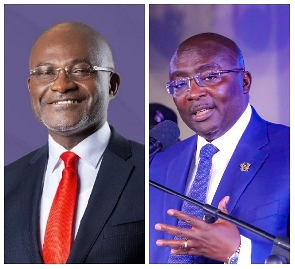In a striking and unapologetic commentary that has reignited political discourse within the New Patriotic Party (NPP), Hon. Kennedy Ohene Agyapong has publicly questioned the legitimacy of Dr. Mahamudu Bawumia’s continued aspiration to lead the party into the 2028 general elections. His remarks, made in a widely circulated video on June 8, 2025, underscore what he perceives to be a significant electoral failure that should, in his view, preclude the former Vice President from being re-nominated as flagbearer.
Kennedy Agyapong, a longstanding Member of Parliament and one-time presidential hopeful within the NPP, referenced the results of the 2024 general elections as the clearest indicator of Dr. Bawumia’s unsuitability for another run at the presidency. According to Agyapong, the party’s defeat by a margin of over two million votes was not merely a loss, but a categorical repudiation of its leadership and strategy. He argued that such a wide electoral gap cannot be excused or minimized and must be treated with the seriousness it deserves if the NPP is to retain credibility among its grassroots and national electorate. This is not the first time Agyapong has spoken forthrightly about the direction of the party, but his tone on this occasion was noticeably resolute. Drawing comparisons between Dr. Bawumia and former party leaders, particularly John Agyekum Kufuor and Nana Addo Dankwa Akufo-Addo, he stressed that both individuals, despite facing electoral defeat, were able to demonstrate formidable public support and a growing national appeal during their initial runs. In contrast, he insisted that Bawumia’s performance in 2024 represents a fundamental rejection that cannot be overlooked. Agyapong’s critique is rooted in a broader argument about the importance of political performance and accountability. He noted that leadership in a political party, especially in a democratic and competitive environment such as Ghana’s, ought to be merit-based and reflective of popular will. In his words, “We do not recycle failure,” an assertion that speaks both to his rejection of complacency within the party and his belief in the need for a rejuvenated leadership that can inspire confidence among the electorate.
Underlying Agyapong’s remarks is an appeal to party delegates, many of whom will play a pivotal role in determining the NPP’s future leadership. He contended that there is a strong and growing sentiment among the rank and file of the party that a new direction is needed. In making this case, Agyapong positions himself not only as a critic but as a viable alternative, one who, in his view, more closely represents the aspirations of the party’s base and possesses the requisite independence, experience, and clarity of purpose to restore the party’s standing. The implications of Agyapong’s comments are manifold. At a practical level, they signal the opening salvos of an impending leadership contest within the NPP, one likely to be characterized by fierce debate over ideology, strategy, and vision. His critique forces a public reckoning with the party’s 2024 loss, inviting both reflection and accountability from those who led the campaign and contributed to the strategic direction that culminated in defeat. More broadly, Agyapong’s stance highlights an increasingly polarized internal landscape within the NPP. While Dr. Bawumia still retains significant support among key factions of the party, particularly those aligned with the technocratic and northern regional wings, Agyapong’s appeal may resonate with those who feel disillusioned by what they perceive as top-down leadership and a disconnect from the party’s traditional grassroots identity. Indeed, the NPP finds itself at a critical juncture. Having presided over Ghana’s affairs for eight years under President Nana Akufo-Addo and subsequently suffering a significant electoral setback under Bawumia’s leadership, the party must now confront the challenges of renewal and relevance. Whether it chooses to do so by reaffirming Bawumia’s candidacy or embracing a new contender, such as Agyapong, will reveal much about its internal health and strategic foresight. Notably, Agyapong’s intervention also raises substantive questions about the role of performance metrics in party leadership. In Ghana’s political culture, loyalty and seniority often compete with empirical outcomes in determining leadership succession. By foregrounding electoral performance as the decisive metric, Agyapong implicitly challenges entrenched practices and calls for a more rationalized and results-oriented political ethos.
The coming months will reveal the extent to which Agyapong’s critique resonates within the broader party structure and how Dr. Bawumia and his supporters choose to respond. What is clear, however, is that the road to 2028 will be neither smooth nor uncontested. As the NPP begins the long process of introspection and reorganization, it must contend with growing calls for reform, transparency, and authenticity, calls that voices like Agyapong’s are amplifying with increasing intensity. In this political moment, Kennedy Agyapong is not merely contesting a candidacy; he is contesting the very assumptions that have governed leadership selection in the party for decades. Whether his vision will prevail remains uncertain, but his challenge has undoubtedly altered the landscape of the NPP’s internal politics, setting the stage for a consequential struggle over its identity and future.

